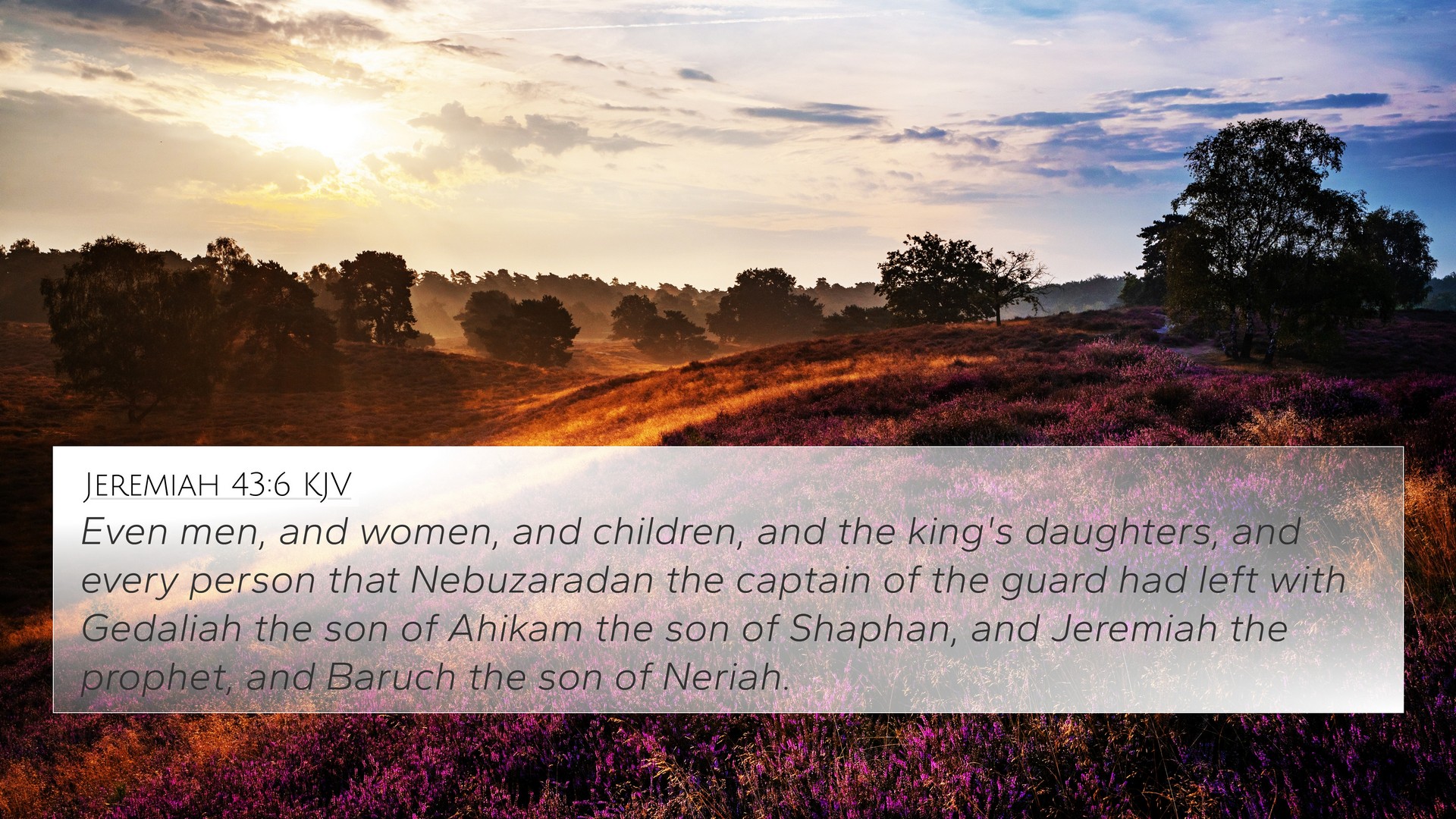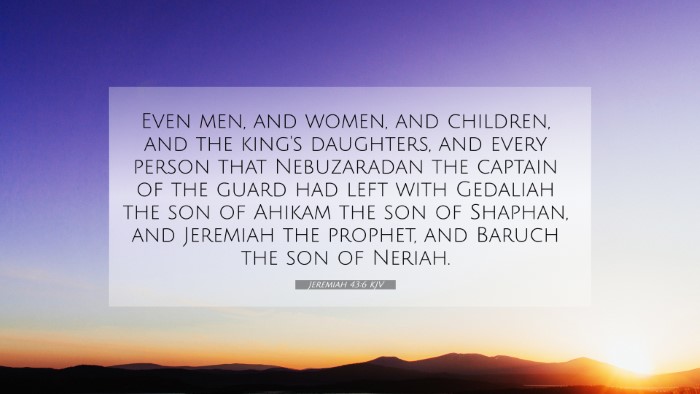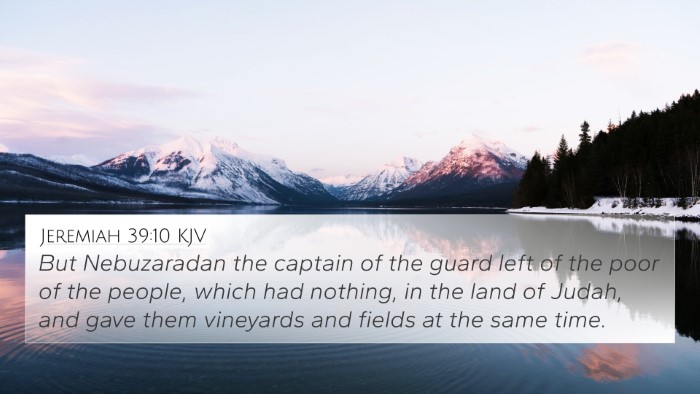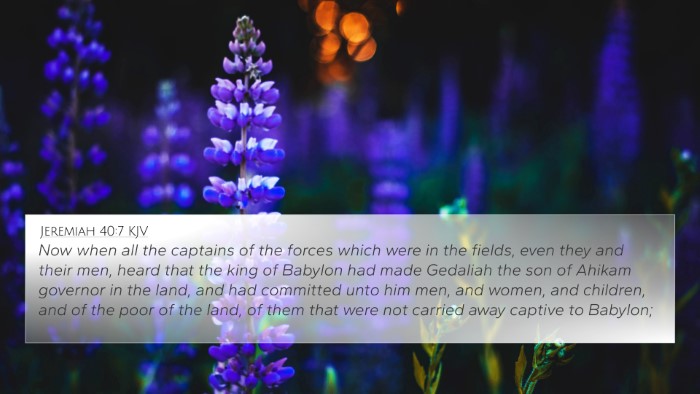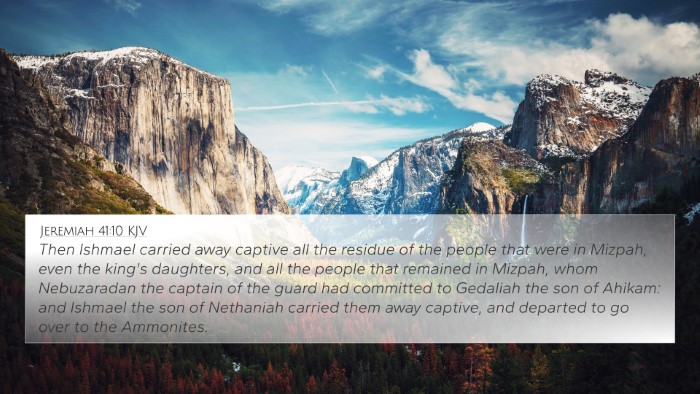Understanding Jeremiah 43:6
Jeremiah 43:6 states: "And they took the men, and the women, and the children, and the king's daughters, and every person that Nebuzaradan the captain of the guard had left with Gedaliah the son of Ahikam, and they came into the land of Egypt: for they obeyed not the voice of the LORD: thus came they even to Tahpanhes." This verse encapsulates the dire consequences of disobedience and the grave decision of the people to flee to Egypt despite divine warnings.
Summary of Commentary Insights
Various public domain commentaries provide valuable insights into this verse, shedding light on its meaning and implications.
Historical Context
Matthew Henry emphasizes the historical context of the verse, explaining that these events occurred after the fall of Jerusalem. The community's decision to go to Egypt represents a rejection of God's guidance as they sought refuge in a foreign land influenced by fear and despair.
Divine Disobedience
Albert Barnes highlights the theme of disobedience displayed by the people. They deliberately chose not to heed the word of the Lord delivered through Jeremiah, thus demonstrating a significant lack of trust in God’s promises for their protection and restoration.
The Fate of the Remnant
Adam Clarke discusses the fate of those who left with Gedaliah, noting that their failure to remain in Judea led to dire consequences, including loss and continued suffering, as they placed their hope in uncertain human means rather than divine assurance.
Theme of Refuge
The theme of seeking refuge in foreign lands recurs throughout the Scriptures. This event connects to other instances where God's people sought security outside His will, reflecting a recurrent motif in biblical narratives about trust and the consequences of turning away from God's path.
Cross-References
- Jeremiah 42:14-16: This passage reflects the people’s desire to escape to Egypt, showcasing their refusal to trust God's provision.
- Isaiah 31:1: Warns against seeking help from Egypt instead of the Lord, emphasizing trust in divine leadership.
- Exodus 14:12: Features the Israelites' desire to return to Egypt during their exodus from slavery, a sign of disbelief.
- Jeremiah 41:18: Pertains to the fate of those who remained in Judea as the walls fell, underscoring the similarity of circumstances.
- Ezekiel 17:15: Discusses the folly of relying on Egypt instead of God, linking themes of betrayal and reliance.
- Psalm 146:3: Encourages trust in God over princes, reaffirming the value of divine trust.
- Deuteronomy 17:16: Advises against returning to Egypt, linking to the broader biblical theme of reliance on God.
Thematic Connections
The themes found in Jeremiah 43:6 connect deeply with other biblical passages. This reflects a broader narrative of the Israelites grappling with faithfulness amidst trials.
Scriptural Cross-Referencing
Cross-referencing different biblical texts provides a multi-dimensional understanding of the themes at play. For example, exploring how the narratives in Jeremiah intertwine with those in the Gospels reveals types and shadows of how God continues to call His people back to faithfulness.
Inter-Biblical Dialogue
The inter-biblical dialogue present in this text showcases the continuity of God's message throughout Scripture, emphasizing the importance of obedience to God's word across both testaments.
Tools for Biblical Understanding
For those seeking to delve deeper into Jeremiah 43:6 and its connections, tools for Bible cross-referencing such as concordances and thematic studies are invaluable. Utilizing a bible concordance can help readers identify connections and parallels across different texts, thus enhancing their understanding of the Scriptures.
Conclusion
In summary, Jeremiah 43:6 serves as a profound reminder of the perils of disobedience and the importance of trusting in God's guidance. Through comparative analysis of related scripture, the rich tapestry of biblical teachings concerning faith, obedience, and divine preservation is revealed. This verse not only speaks to its immediate historical context but extends its significance into broader theological discourse, linking believers to God's unchanging nature and their need for steadfast faith amidst uncertainty.
Final Reflection
As we consider Jeremiah 43:6, we are encouraged to reflect on our own lives in relation to God's instructions. The decision to seek refuge in places apart from God remains a relevant theme today, prompting us to examine where we place our trust and security.
